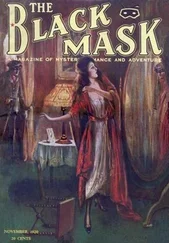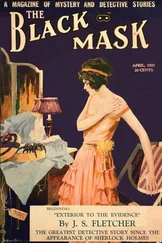John Baer - The Black Mask Magazine (Vol. 5, No. 5 — August 1922)
Здесь есть возможность читать онлайн «John Baer - The Black Mask Magazine (Vol. 5, No. 5 — August 1922)» весь текст электронной книги совершенно бесплатно (целиком полную версию без сокращений). В некоторых случаях можно слушать аудио, скачать через торрент в формате fb2 и присутствует краткое содержание. Город: New York, Год выпуска: 1922, Издательство: Pro-Distributors Publishing Company, Жанр: Детектив, на английском языке. Описание произведения, (предисловие) а так же отзывы посетителей доступны на портале библиотеки ЛибКат.
- Название:The Black Mask Magazine (Vol. 5, No. 5 — August 1922)
- Автор:
- Издательство:Pro-Distributors Publishing Company
- Жанр:
- Год:1922
- Город:New York
- ISBN:нет данных
- Рейтинг книги:4 / 5. Голосов: 1
-
Избранное:Добавить в избранное
- Отзывы:
-
Ваша оценка:
- 80
- 1
- 2
- 3
- 4
- 5
The Black Mask Magazine (Vol. 5, No. 5 — August 1922): краткое содержание, описание и аннотация
Предлагаем к чтению аннотацию, описание, краткое содержание или предисловие (зависит от того, что написал сам автор книги «The Black Mask Magazine (Vol. 5, No. 5 — August 1922)»). Если вы не нашли необходимую информацию о книге — напишите в комментариях, мы постараемся отыскать её.
The Black Mask Magazine (Vol. 5, No. 5 — August 1922) — читать онлайн бесплатно полную книгу (весь текст) целиком
Ниже представлен текст книги, разбитый по страницам. Система сохранения места последней прочитанной страницы, позволяет с удобством читать онлайн бесплатно книгу «The Black Mask Magazine (Vol. 5, No. 5 — August 1922)», без необходимости каждый раз заново искать на чём Вы остановились. Поставьте закладку, и сможете в любой момент перейти на страницу, на которой закончили чтение.
Интервал:
Закладка:
He had come to see her, then. The six months that followed had been the happiest she had ever known. She had been in New York for over a year, ever since her aunt died in Ferrisville, and nothing had happened to her, nothing that is, but long hours of work or longer and wearier hours of searching for work. The men she had met had been stupid, impossible creatures, mostly friends or brothers of the girls who worked next to her. Then she had met Dennison and he had altered everything.
She remembered, now, those first six months she had known him. He used to call for her in his neat little car, after work. The last half hour in the store she would spend surreptitiously arranging her hair, powdering her face, applying her lip stick, though she didn’t make up a great deal, those days. At twenty-one one doesn’t need artifices. Then they’d go to funny little restaurants Dennison knew about, Italian places where you’d get awfully good things, little French places, a Swiss restaurant uptown. Sometimes, Dennison would take her home, then, if you can call a rooming house home. Sometimes, they’d go to the theatre. Then, Dennison had an accident with the car and sold it. After a few weeks there would creep into his talk the desire to be with her when no one was around, his want to “have her to himself.”
“How can I talk to you,” he’d say, “in a movie theatre or in restaurants or parks. Am I never to have a minute of you to myself?”
It seemed not. Then he suggested his apartment. Until then, it seemed, Dennison had shared an apartment with another chap. Now the other man had left New York.
“You’d feel more at home up there,” Dennison had told her. He’d beg her to come up, fix him a cup of tea, be comfortable, where he could hold her hand if he felt like it.
She had hesitated — she had been a simple little thing, then. She had gone, of course. They would get dinner, together, after that, bringing in a hot roasted chicken and crisp fried potatoes from a rotisserie and preparing a salad, themselves. Dennison could make a couple of salad dressings. They would buy French pastry and make coffee. Evenings were happy, though always over them hung the fact that Irene had to hurry away, had to be up early the next morning, was afraid of kisses that frightened her.
“Why do you want to go?” Dennison would ask. “You know I love you. Can’t you let me take care of you? I hate to think that my girl has got to go to a horrid little room, when she could stay here with me, instead. I don’t want my girl to work all day.
That was it — his girl. She had cared for him. She knew that. With his arms around her, the soft lamps, the pot of hot coffee, the occasional cocktail, it hadn’t been easy to go.
One night it began to rain. She could have got a taxi, of course. She had gone home in taxis, other nights. But Dennison’s arms were around her, his lips pressed to hers. She was comfortably drowsy and awfully happy and young.
The next day she went back to her room, packed the square trunk, told her landlady she was going to share an apartment with another girl. She gave up her position at McNally’s. Two years ago...
Dennison had been all she had dreamed he would be, that first year, tender, affectionate, thoughtful. Then little things began to creep in... he would object to things she’d say, to the way she laughed. He corrected errors of speech rather impatiently. But even then, he was good.
It wasn’t until this last year that he didn’t come home, every evening. He took a room at his club. It was lonely, then. If she had been another girl — another sort — Irene felt she might have gone with other men. She didn’t. She stayed in the apartment, waited. Dennison was no longer thoughtful nor affectionate. He found fault, didn’t like the way she did things. She tried hard to arrange the table daintily, pored over cook-books, spent hours preparing foods he was especially fond of.
Then he told her about Margaret Harrington. He was going to marry Miss Harrington — a suitable match in every way. Irene should have known this wouldn’t last — he had been fond of her, of course — he would do what he could.
Then, Irene knew she hated him. She knew that all the love she had had for him had disappeared — had turned into one huge hatred. She wanted to get even. She wanted to leap at him, pound him with her fists... why... kill him, even. That was it — kill him! She remembered something she had read — in the Bible she thought it was — “Hell hath no fury like a woman scorned.” She thought that was it. Well, he had scorned her. She wanted to get even.
V
Now, Dennison was gone. Lying in bed, now, Irene thought of him. How could she get even. Of course — she could kill him. But she’d be found out — sent to the electric chair. She might get off. of course — most women did — but she mightn’t be lucky. The chair! She shuddered. Someone had told her, once, that a few hours before a person was electrocuted, he was doped so that when the time came he was scarcely conscious of what was happening. That was the reason cowards appeared brave at their death, her informant had said. Maybe that was true. She didn’t know. Even so, she didn’t want to be electrocuted. She’d be found out, of course, if she killed Dennison — or if she killed Miss Harrington. Anyhow, it wasn’t Miss Harrington she wanted to get rid of, after all. Miss Harrington was just a part of a game, as she was part of a game. No, definitely, it was Dennison. She must get even. Kill him? She knew she couldn’t actually kill him, though, at that.
How could she, a poor, friendless little thing, get even with anyone. She didn’t have any influence of any sort. She had lived so entirely for Dennison, these two years, that she hadn’t kept up with her acquaintances from the store, even. The only people she ever talked to were the neighbors. They couldn’t do anything to help her. She felt helpless, trapped. She must do something.
She thought of killing herself. She couldn’t quite do that, wasn’t brave enough. Why should she die, anyhow? She was too young to die, not twenty-three, yet. No, she wanted to live — she wanted to live and get even — to kill Dennison.
Dennison was gone — never to come back. The rent for the apartment would have to be paid in a few days. She couldn’t even keep on living there. She had a little money, though— What could she do?
She got up, went to the door, found the newspaper there, brought it in, sat on the edge of the bed reading it.
She glanced at the usual headlines; politics, world affairs. They didn’t interest her. She turned to the inside pages, listlessly. What did anything matter to her?
Little scandals, divorces, deaths. She read them all, all seeing. What was this? She read a small item:
Miss Grace Trummer, about twenty-five years old, a pretty little blonde seamstress, committed suicide at a rooming house in ..... Street, last night, by inhaling gas. Miss Trummer left no reason for the deed, and, as far as is known, she had no relatives—
Irene dropped the paper on the bed. There, that was a way out — gas. She could do that — could end things that way. What if she did? That wouldn’t hurt Dennison. He’d be glad she. was out of the way, really. If she could be found dead! If Dennison could be blamed! That would be something. He would be electrocuted for her murder! Of course! That would be clever!
In her mind, now, she went over the whole thing — how she could kill herself — and leave little evidences about, so that it would look as if Dennison had killed her. She’d have to be careful, of course. Why, of course. She would have to make it look as if Dennison had planned to make it look like suicide or burglary! Burglary would be best. Dennison would die! She laughed almost wildly over that. She dressed and laughed all the while. She felt sort of funny. Was she mad? She didn’t think she was. Of course not. Yes, that’s the way she’d do things.
Читать дальшеИнтервал:
Закладка:
Похожие книги на «The Black Mask Magazine (Vol. 5, No. 5 — August 1922)»
Представляем Вашему вниманию похожие книги на «The Black Mask Magazine (Vol. 5, No. 5 — August 1922)» списком для выбора. Мы отобрали схожую по названию и смыслу литературу в надежде предоставить читателям больше вариантов отыскать новые, интересные, ещё непрочитанные произведения.
Обсуждение, отзывы о книге «The Black Mask Magazine (Vol. 5, No. 5 — August 1922)» и просто собственные мнения читателей. Оставьте ваши комментарии, напишите, что Вы думаете о произведении, его смысле или главных героях. Укажите что конкретно понравилось, а что нет, и почему Вы так считаете.












